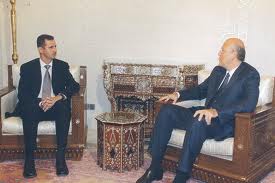 Prime Minister Najib Mikati confirmed in an interview broadcast on Friday that opposition figures from neighboring Syria had been kidnapped in Lebanon, but said they were isolated incidents. “This happened several months ago, before the formation of the government” in mid-June, Mikati said of the kidnappings.
Prime Minister Najib Mikati confirmed in an interview broadcast on Friday that opposition figures from neighboring Syria had been kidnapped in Lebanon, but said they were isolated incidents. “This happened several months ago, before the formation of the government” in mid-June, Mikati said of the kidnappings.
Since anti-regime protests broke out in Syria and the regime of President Bashar al-Assad began a bloody crackdown, an estimated 5,000 Syrians have sought refuge in Lebanon, among them deserting soldiers and members of the opposition.
“There are individual cases,” Mikati said, “but we cannot generalise and say the entire situation is unstable. Yes, there were some incidents, but of an individual character.”
Asked about police inquiries indicating that the Syrian embassy in Beirut had had a hand in the kidnappings of at least four Syrian opposition figures, Mikati said “the judicial system will do its duty and we will support it.”
The Syrian ambassador has rejected the allegations.
“I am puzzled by these unfounded claims that have been attributed to the police chief,” Ali Abdul Karim Ali said in October.
Turning to the events in Syria, Mikati said “we are not partisan, neither for nor against … We have adopted a position of neutrality.”
But Foreign Minister Adnan Mansour, who represents the Hezbollah-led, and Syrian-supported, majority in Mikati’s government, has stressed his country’s support for the Assad regime at a string of Arab League meetings on Syria.
On Wednesday, Lebanon’s opposition called on the government to end what it charged was its support for the Syrian regime, warning that Beirut risked isolation.
“We demand the government immediately cease its support for the Syrian regime, including its diplomatic support, so as to ensure Lebanon does not find itself isolated from Arab … and international legitimacy.”
Mikati told the BBC: “Syria is a neighbouring country, and we have decided to stay out of it. We want to preserve the unity of Lebanon.”
BBC

Leave a Reply
You must be logged in to post a comment.